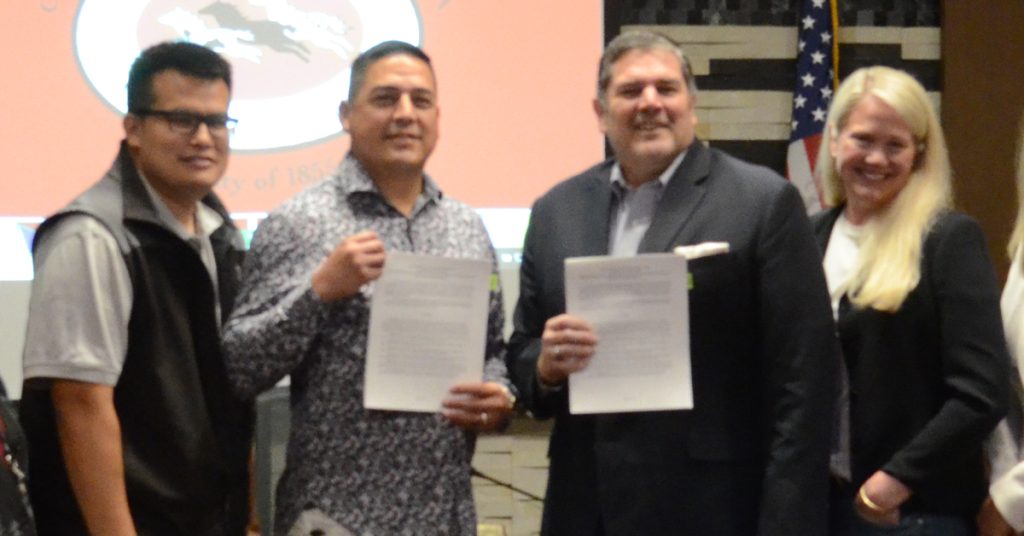By CHRIS AADLAND
Confederated Umatilla Journal
PENDLETON, Ore. — Tribal leaders signed a first-of-its-kind agreement with a corporate entity today, further establishing a partnership and ensuring consultation in development projects that could affect land or resources important to Confederated Tribes of the Umatilla Indian Reservation community members.
The agreement, a Memorandum of Understanding with Amazon Web Services, builds on a years-long relationship between the two entities and defines how the two will work together or resolve disputes involving AWS development projects on CTUIR ceded lands or traditional use areas. It guarantees that the tribe will play a prominent role in protecting access to land or resources on CTUIR ceded and traditional use lands.
“This agreement helps address potential impacts to our cultural and natural resources,” said Aaron Ashley, CTUIR Board of Trustees Vice Chair, during the morning signing ceremony. “We see this agreement as providing important benefits for both parties.”
Amazon Web Services, a subsidiary of Amazon that provides services, like cloud computing platforms, has invested billions in the region over the last decade and has developed projects in the area, such as data storage centers, on ceded CTUIR lands.
The CTUIR Board voted to adopt the MOU on September 11. Several representatives from AWS and five BOT members attended the signing, which was followed by lunch.
The MOU is the tribe’s first such agreement with a corporate entity. It is also believed to be AWS’s first such agreement with a tribal nation, according to Roger Wehner, Director of Economic Development for Amazon Web Services.
While the tribe and AWS have collaborated on development projects and initiatives – like language revitalization – over the last several years, the agreement lays out a vision of what the partnership will look like going forward and commits the company to a consultation, review and mitigation process for projects that could negatively affect natural resources, areas of traditional or current use, and cultural or historic sites.
No new development projects or partnerships were announced with the MOU, but Wehner said the future could include working together to protect natural resources or create economic development opportunities that would benefit both.
“This document is an articulation of what we’ve been doing in our partnership for seven, eight years now,” he said after the signing.
Amazon Web Services’ consultation with the tribe on development projects on CTUIR ceded lands and traditional use areas has been at a level rarely matched by other private companies, Ashley said.
“Many times, our resources and our ability to exercise our treaty rights has suffered as a result,” he said, before thanking the CTUIR Cultural Resources Protection program and staff for spearheading the effort.
During a BOT work session held earlier in September to finalize the MOU’s language, Teara Farrow Ferman, CTUIR Cultural Resources Protection program manager, said work with AWS in recent years has included cultural resource reviews and mitigation at sites where AWS has wanted to build data centers on ceded lands.
It’s also included AWS guaranteeing spots in events, like a girls’ “tech day” and fiber splicing training for tribal members, she said. Staff members from the two entities have also held frequent meetings to discuss projects. In addition, Farrow Ferman said AWS has donated money to the CTUIR after school program and is planning to give $150,000 to the Tamástslikt Cultural Institute to update exhibits.
AWS wanted to expand its relationship with the tribe and do more community outreach, so she told the company that it would be “good to memorialize our relationship” through a MOU similar to agreements the tribe has with local governments, Farrow Ferman said at the work session.
The partnership over the years has also led to Amazon leaders and staff becoming better informed about CTUIR culture, history and First Foods, Wehner said.
Though he said he had to work hard at first to learn more about the CTUIR community, that education and a commitment to be a good partner with the tribe has led to the company implementing broader policies and protocols around cultural resource protection.
“When we first started, we probably didn’t really have a fulsome understanding of what that commitment meant,” he said. “For us, our commitment going forward beyond this document is that we’ll continue to learn.”




